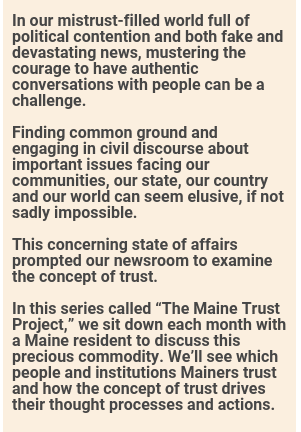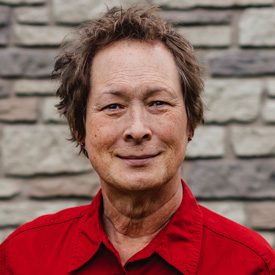When Jean Vermette told her family that she felt more female than male and she was going to explore what that meant for her, she did so in a letter.
She didn’t want to put them on the spot by telling them in person. She wanted them to have the time and space to think about it before talking with her about it.
 “That’s the big fear for everybody. This is your family. You’re never sure. My parents had gone through a lot with six kids: suicide attempts, drugs, alcohol. All that stuff,” she said. “They always expressed their love and always expressed their acceptance of us. But you always wonder: Is this going to be the one thing that’s too much? So that held me back for a while.”
“That’s the big fear for everybody. This is your family. You’re never sure. My parents had gone through a lot with six kids: suicide attempts, drugs, alcohol. All that stuff,” she said. “They always expressed their love and always expressed their acceptance of us. But you always wonder: Is this going to be the one thing that’s too much? So that held me back for a while.”
From the time she was a young child, Jean felt female even though she clearly wasn’t. In 1954, she was born with the body of a boy into a Franco-American, Catholic family. Her parents raised Jean and her five siblings in Skowhegan, where she had a typical (for the socially turbulent times), happy childhood, she says.
It wasn’t until she was a teenager that Jean became aware that other people felt like she did and that it was possible to exist as female even though she was born male. Unfortunately, her exposure to such a possibility wasn’t a positive one. She learned about transgender people through magazines that ran sensational articles about men becoming women, and the people in those articles were usually portrayed as mean and bad and sinful, she said. “I’m not mean and bad and sinful,” Jean thought to herself, “so I can’t be one of them.”
For 30 or so years, she kept turning over in her mind the possibility of living as a woman, but didn’t really pursue it. She started her own business as an electrician in the Bangor area, and married. It was during that marriage that she realized she needed to at least investigate whether she needed to go in that direction.
But it wasn’t until after divorcing that she began taking more deliberate steps: seeking counseling, joining a support group, dressing as a woman in public, taking hormones, five years of weekly electrolysis sessions to remove her beard, telling her family (who accepted and supported her) and business clients (the majority of whom also supported her.)

She took things slowly. She needed to trust that her desire to be female was core to her own being rather than something she was unconsciously using as a crutch to avoid something else, she said.
With each step she took along in the process, she would stop and evaluate: Could she be happy here? When the answer was no, she’d take the next step and evaluate again: How about here? “I always told myself that if I can be happy there, I should stop,” she said. “I don’t need to go any further than I need to go to be happy.”
Starting around the age of 35, she spent about six years completing the gender reassignment process. When the reassignment surgery was done, she felt instantaneously complete, she said.
“I wasn’t expecting that it was going to make me happy,” she said. “I wasn’t relying on it for my happiness, but I was relying on it for simple day-to-day comfort in my physical body. Just psychological comfort. And that’s all it was for. I wasn’t thinking, ‘OK, I’m going to do this. My life’s going to change. It’s going to be happily-ever-after.’
“I knew none of that was going to happen, but I just needed to feel comfortable within myself, within my body, and that’s the step that was needed.”
Q&A
Who meets your definition of trust?
Jean: I guess it depends on which level of trust. Absolute trust? Probably God. But beyond that, everybody I’ve ever run into has some things I trust and some I don’t. I might trust someone to do this or that, but I might not trust them in other respects. It depends on the person, on the situation, and what it is I’m being trustful of.
Who doesn’t meet your definition of trust?
Jean: I don’t think anybody doesn’t meet my definition of trust. Nobody’s completely trustworthy, but nobody’s completely untrustworthy. Anybody can be trusted in some ways and anybody cannot be trusted in some ways.
What breaks trust for you?
Jean: I’m not sure break is the right word because that implies something that would be very difficult to fix. If you trust someone or something and they don’t live up to your expectation, I guess you could call that broken trust. I would call it a part of the growth process.
Now you have a piece of information — I can’t trust this person with X in Y situation, for example — and having that information improves my ability to trust, and is going to be a benefit for the relationship, in my mind. If you trust someone with something three, four, five times and they always disappoint you, isn’t that going to be a burden on your relationship? But if you understand that that can’t happen — that you can’t trust them for that particular thing — you won’t ask them for that anymore, so you don’t have to worry about that or feel hurt about that, and, instead, other areas of your relationship can flourish.
Can broken trust be healed, and if so, what has to happen for healing to take place?
Jean: If we call it broken trust for a particular thing, then what would reestablish trust for me would be for someone else to tell me that they trusted that person with something and that person came through. Then, maybe, I’d try again. And if that person does come through, then things are sort of repaired. There’s always a chance to reestablish trust.
Has your definition of trust changed over the years?
Jean: I don’t remember what my definition of trust was many, many years ago, but I would say probably, because if trust is a process, then clearly, you’re processing and growing, maturing and changing over time, so your understandings must be (as well.)
Has the cultural definition of trust changed over the years?
Jean: I guess that depends on who you talk to. Some would say yes, and others would say no depending on their perspective. We have different understandings about how things can be or should be or ought to be. Some may think the cultural definition has changed, and not necessarily in a good way, while others may think things haven’t changed enough.
What worries you?
Jean: I can’t say that I’m worried about anything. I stopped watching the news because it wasn’t helping me and only made me feel bad, so I don’t worry about that. I’m not worried about the present state of political affairs because I’ve been through enough cycles to know things will change. I’m not worried about climate change. Whether we created it or not is irrelevant. It’s here and we’re going to deal with it one way or another. What’s the worst that can happen? We’ll die. We’ve died before and we’ll do it again.
What inspires you?
Jean: Spiritual growth inspires me. I think it’s inevitable. I believe there’s a creator from which all creation arises. We’re all tied to it and are part of it and, eventually, we’ll gain the recognition of that connection. I think that’s part of the maturity process. There’s the belief on my part – as yet unproven – that spiritual growth carries with it an increasing degree of internal happiness, completeness and fulfillment.
What issues do you think are important today?
Jean: Nothing specific. As the Bible says, it’s all vanities.
Get to know Jean Vermette
Age: 65
Hometown: Brewer
Religious affiliation: She grew up Catholic, but is not associated with any specific religion. However, she describes her spirituality as a blend of Buddhism and Hinduism.
Political affiliation: Independent.
How she describes herself: Spiritual; fascinated by life; curious; searching.
How she defines trust: I looked it up in the dictionary, which says, “the firm belief in the reliability, truth, ability, or strength of someone or something.” I think that implies that trust is something like a car or a pen, or something that you have or that I have. I don’t really think that’s what it is. I think trust is more of a process than a thing. It’s a process that changes over time with maturity and discernment. And it is based more in the person doing the trusting than whoever or whatever it is that is being trusted.







